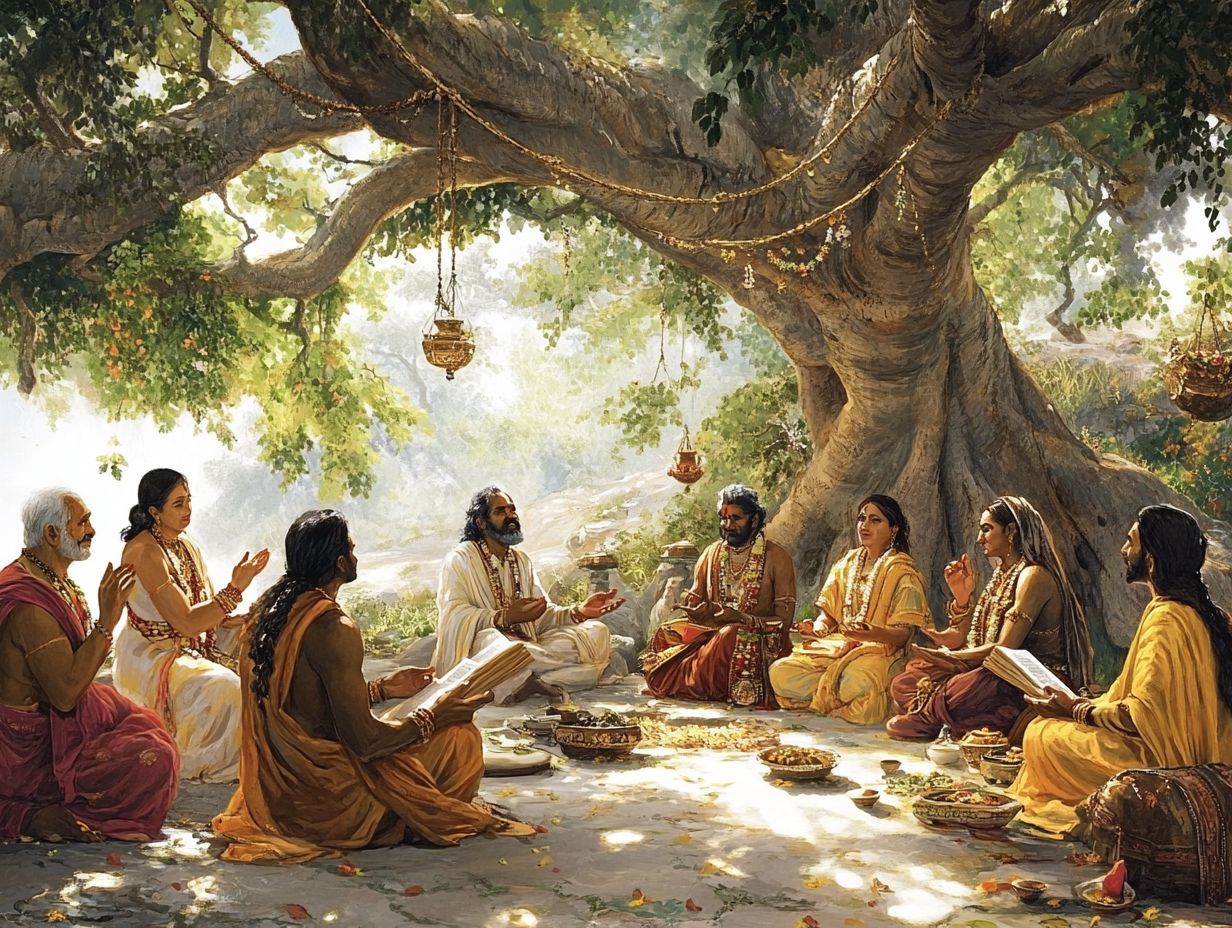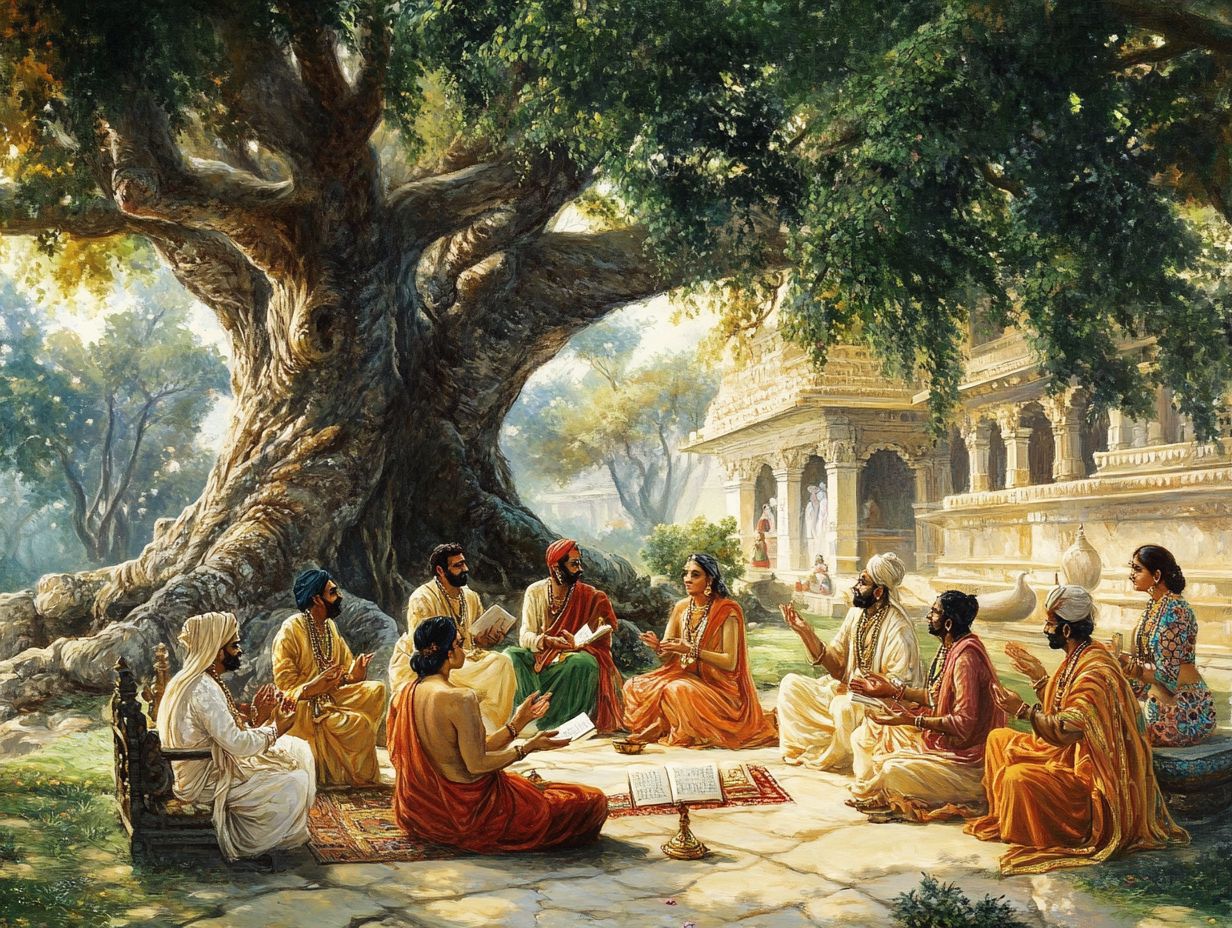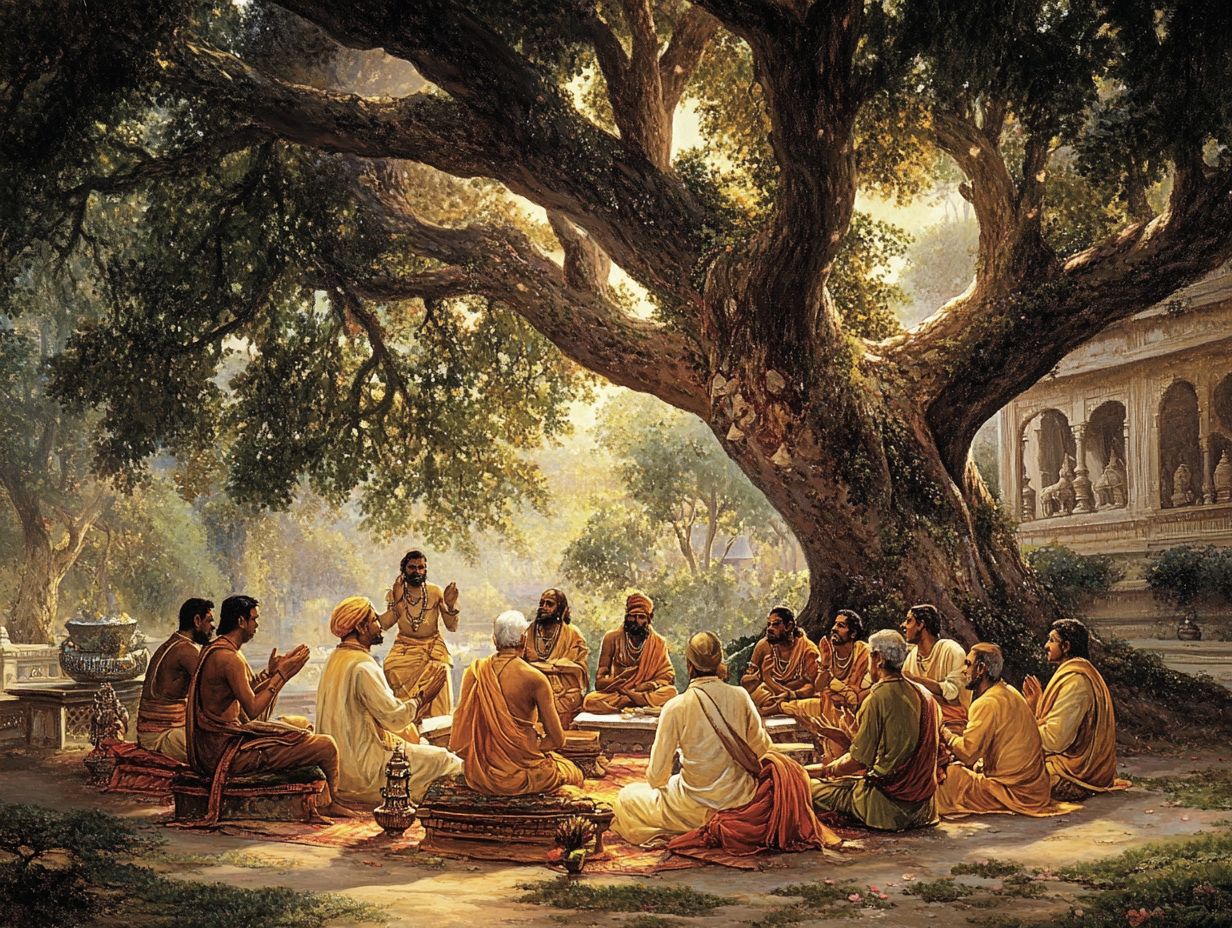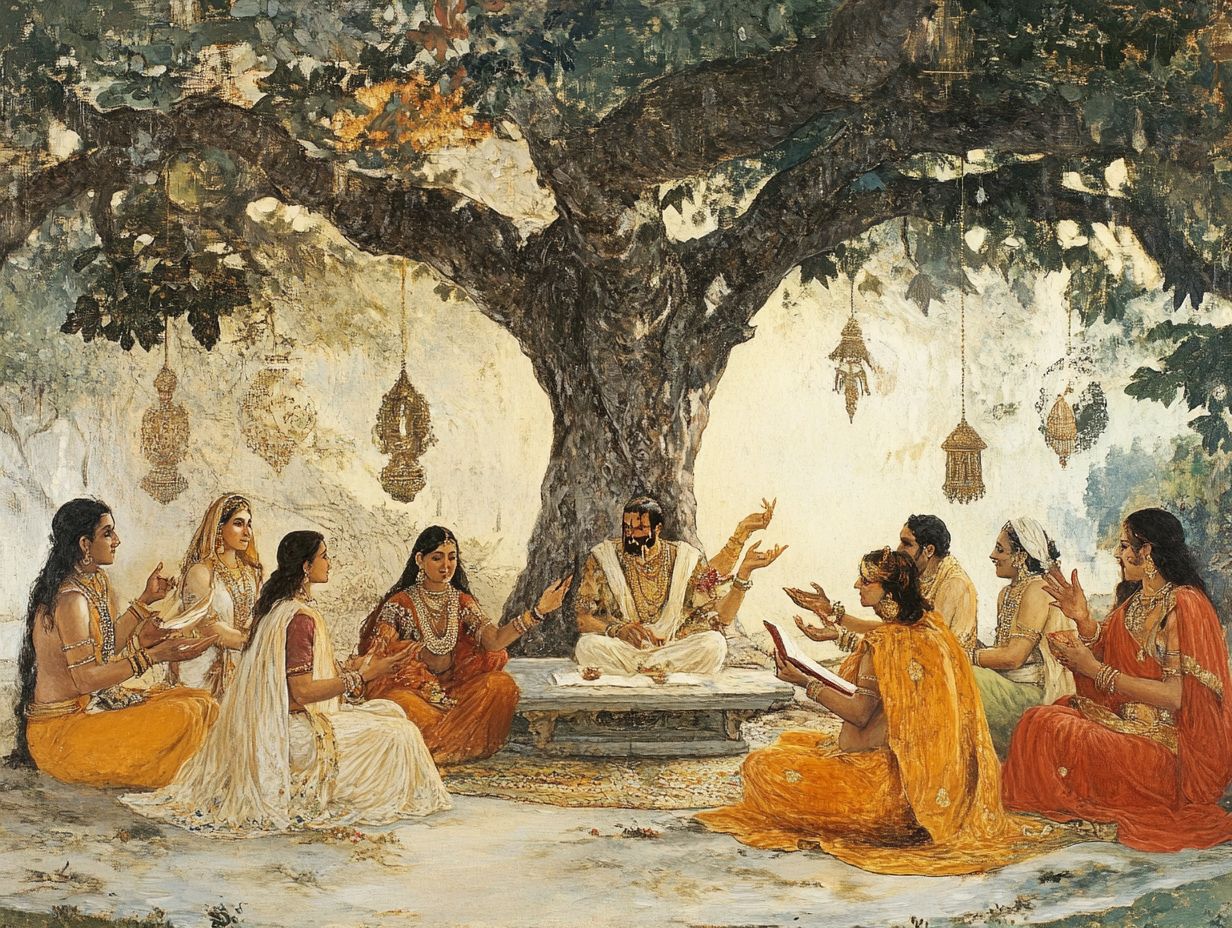Is Hinduism an Open Religion?
Hinduism, recognized as one of the world’s most ancient religions, is often defined by its intricate tapestry of beliefs, practices, and various sects. The question arises: what does it truly mean for a religion to be “open,” and how does Hinduism align with this concept, especially in the context of its sacred texts like the Vedas, Upanishads, and Bhagavad Gita?
This article delves into the essence of Hinduism, thoughtfully examining its foundational beliefs and the myriad sects or denominations that comprise it. It highlights the religion’s perspective on conversion, syncretism, and interfaith marriages, illustrating how it embraces external influences.
Furthermore, it addresses certain criticisms related to its perceived openness, offering a nuanced understanding of how Hinduism skillfully balances tradition with inclusivity and religious pluralism.
What is Hinduism? Understanding its Sacred Texts and Philosophical Schools

Hinduism stands as one of the oldest and most diverse belief systems in the world, embodying a rich tapestry of spirituality, rituals, and philosophical thought that has evolved over millennia.
As an open religion, it invites individuals and communities to delve into its sacred texts, including the Vedas, Upanishads, and the Bhagavad Gita. These texts foster a profound belief in the interconnectedness of all life, articulated through key concepts such as karma, dharma, and the pursuit of moksha and reincarnation or samsara.
Its cultural practices and community traditions reflect a deep respect for individuality and pluralism, facilitating a unique exploration of faith that resonates across generations and emphasizes moral values and ethical living.
Is Hinduism an Open Religion?
Hinduism is frequently esteemed as an open religion, celebrated for its inherent inclusiveness and pluralistic nature, which enables a myriad of beliefs and practices to flourish within its expansive framework. This characteristic openness is underscored by a profound emphasis on religious freedom and the acceptance of diverse faith traditions.
It encourages adherents to delve into their spiritual journeys and grapple with existential inquiries in a climate of tolerance. The rich tapestry of sects, rituals, sacred narratives, and interpretations found within Hinduism stands as a testament to its dedication to fostering harmony and coexistence among its practitioners.
What Does it Mean to be an Open Religion?
An open religion embodies the essence of cultivating an environment where inclusivity and pluralism flourish, allowing followers to embrace a spectrum of faiths and interpretations while maintaining respect for individual beliefs. This concept fosters a rich tapestry of traditions and practices, contributing significantly to the broader landscape of spirituality.
In this context, the importance of community and shared values leads to a more harmonious coexistence, encouraging individuals to embark on their own faith journeys while valuing the beliefs of others.
Such an open religion give the power tos its adherents to engage in meaningful conversations that transcend boundaries, facilitating the exploration of shared truths and values that exist among diverse belief systems. It inspires followers to approach their spiritual pursuits with curiosity and openness, promoting deeper connections within their communities.
By endorsing interfaith dialogue and promoting values like ahimsa or non-violence, this religious framework not only enhances individual understanding but also nurtures collaboration and mutual respect among varied groups.
Ultimately, this approach can pave the way for a more compassionate society, where individuals are motivated to unite in pursuit of common goals, guided by principles of empathy, social justice, and acceptance.
What are the Core Beliefs of Hinduism?
The core beliefs of Hinduism are centered around the profound concepts of karma, dharma, moksha, and reincarnation, which together create an intricate ethical and spiritual framework. Karma embodies the law of cause and effect that governs human actions, while dharma signifies one’s duty and moral values aligned with the cosmic order. Moksha, regarded as the ultimate aspiration of spiritual liberation, represents liberation from the cyclical nature of reincarnation, urging followers to engage in introspection and ethical living throughout their spiritual journey. This rich tapestry of beliefs not only highlights Hinduism’s pluralism but also showcases its depth of spirituality.
Each of these concepts is intricately linked, fostering a holistic worldview that inspires individuals to contemplate their roles within the universe. The significance of karma extends beyond individual actions, revealing the collective consequences that ripple through society. Likewise, dharma is not a one-size-fits-all notion; it varies among individuals, shaped by factors such as age, caste, and gender, reminding adherents of the complexities inherent in moral decision-making.
As one endeavors toward moksha, the relationship between ethical living and spiritual advancement becomes increasingly apparent, emphasizing the necessity of aligning one’s actions with cosmic principles. The cyclical nature of reincarnation further accentuates the lasting consequences of one s deeds, cultivating a profound sense of responsibility towards oneself and others.
Thus, these interconnected beliefs construct a comprehensive framework that guides ethical conduct and spiritual aspirations.
How Do These Beliefs Affect the Openness of Hinduism?
The beliefs of Hinduism profoundly influence the religion’s openness, cultivating an environment rich in inclusivity and spiritual growth that allows practitioners to explore their faith with remarkable freedom. This openness invites individuals to engage in a wide array of religious practices, ranging from meditation and yoga to vibrant festivals and communal worship, facilitating personal encounters with the divine.
By embracing a multitude of interpretations and practices, Hinduism fosters a culture of acceptance and interconnectedness among its followers, encouraging dialogue and mutual respect in the pursuit of spiritual understanding.
Such a vibrant tapestry of beliefs grants practitioners the liberty to navigate their spiritual journeys without the limitations often imposed by more dogmatic faiths. This inclusivity not only enhances personal development, enabling seekers to forge their unique connections to the divine, but also nurtures a sense of community where individuals can share their experiences and insights. Through attending gatherings and engaging in rituals, followers cultivate relationships that transcend cultural and geographical boundaries.
Ultimately, this open-minded approach enriches the landscape of spiritual exploration, give the power toing devotees to deepen their understanding while embracing the diverse facets of Hindu philosophy.
What are the Different Sects within Hinduism?
Hinduism is a vast and intricate mosaic, comprising numerous sects, each embodying its own distinct beliefs, traditions, and practices that enhance the religion’s remarkable diversity. These sects frequently emphasize different deities, philosophies, and rituals, weaving together a rich tapestry of spiritual expressions that mirror the diverse cultural identities inherent within Hinduism.
From Shaivism and Shaktism to Vaishnavism, each sect presents unique elements that resonate with various adherents, fostering a profound sense of community among followers, while simultaneously upholding the fundamental values of the faith.
What are the Main Differences Between these Sects?

The primary distinctions among the various sects of Hinduism can be found in their beliefs, practices, deities, and associated rituals, which culminate in unique spiritual paths for their practitioners. Each sect highlights different facets of the divine, such as the worship of specific deities or adherence to particular philosophical doctrines, thereby creating distinct religious experiences. This diversity serves to enrich the broader landscape of Hinduism, showcasing its inherent pluralism and its ability to adapt across myriad cultural contexts.
For example, the Vaishnavism sect is centered around the veneration of Lord Vishnu and his avatars, while Shaivism focuses on the worship of Lord Shiva, each providing unique interpretations of existence and spirituality. The Shakta sect, on the other hand, honors the divine feminine, celebrating forms such as Durga and Kali, which diversifies the nature of worship within the tradition and highlights the polytheistic and pantheistic elements of Hinduism.
Moreover, ritual practices vary significantly among these sects; some may prioritize community rituals and temple worship, while others emphasize personal devotion, meditation, and yoga. These distinctions not only shape the religious lives of followers but also influence their interactions with the broader society, underscoring the rich tapestry that comprises Hinduism.
How Open are these Sects to New Members?
The openness of various Hindu sects to new members can vary considerably, with many exhibiting a distinctly welcoming attitude that fosters inclusiveness and religious freedom. While certain sects actively promote their traditions and invite individuals to explore their beliefs, others may impose more stringent membership criteria or practices that dictate entry. This diversity in approach beautifully reflects the pluralistic nature of Hinduism and its remarkable capacity for adaptation within the larger context of faith exploration and cultural exchange.
Within this intricate tapestry, certain sects, such as the Brahma Kumaris, champion universal love and acceptance, willingly welcoming anyone who is committed to their spiritual journey. In contrast, some traditions, particularly specific sampradayas, may enforce stricter guidelines that necessitate prospective members to undergo extensive learning or initiation rituals before they can fully engage with the community.
These contrasting practices highlight a spectrum of beliefs, where some organizations prioritize inclusivity as a core value, while others adhere closely to doctrinal tenets that shape their communal dynamics. This variation elegantly illustrates how belief systems within Hinduism can simultaneously unite and distinguish the pathways for seekers navigating the broader spiritual landscape.
How Does Hinduism View Conversion?
The perspective of Hinduism on conversion is complex and multifaceted; it typically does not engage in active proselytization but rather welcomes those who express a desire to join its community.
This tradition places significant emphasis on personal spiritual journeys and individual beliefs. While the notion of conversion can differ across various sects, numerous Hindu communities embody principles of acceptance and inclusivity, fostering a respectful exploration of faith.
This approach invites individuals to immerse themselves in Hindu practices, rituals, and philosophies as integral components of their spiritual development, irrespective of their initial religious backgrounds.
Is Conversion Encouraged or Discouraged in Hinduism?
In Hinduism, the concept of conversion is approached with a nuanced perspective, neither strongly promoted nor outright discouraged. Instead, it is regarded as a deeply personal choice that resonates with individual beliefs and spiritual paths.
Various Hindu sects emphasize the transformative nature of spirituality, encouraging seekers to engage with their practices and philosophies without imposing rigorous conversion requirements. This ethos underscores the religion’s commitment to inclusivity and respect for the myriad routes to spiritual understanding.
Different sects, such as the Vaishnavas and Shaivites, may display varying levels of openness toward conversion; however, the prevailing theme remains one of personal exploration. For many practitioners, faith is rooted in the individual’s relationship with the divine, rather than dictated by institutional decrees.
This acceptance of diverse spiritual expressions creates a rich tapestry of beliefs, allowing individuals to pursue their quests for truth in a manner that feels authentic to them.
Such attitudes embody a broader comprehension of spirituality, often nurturing communities that celebrate unity while honoring the unique journeys of each individual.
What is the Process of Conversion in Hinduism?
The process of conversion to Hinduism is often characterized by its informal nature and the diversity of practices across various sects. Typically, it encompasses rituals, initiation ceremonies, and a commitment to the beliefs and values of the community.
As individuals embark on this transformative journey, they may engage in rich traditions, such as homa, a sacred fire ceremony that symbolizes purification and a connection with the divine. Concurrently, fostering relationships within the local Hindu community is paramount, as new adherents receive invaluable guidance and support from seasoned practitioners.
The significance of initiation transcends mere participation; it represents a profound commitment to a new way of life and an enriched understanding of fundamental concepts such as karma and dharma. Participation in study circles or satsangs further enhances this transformative experience, allowing individuals to share their journeys and deepen their connections with both the divine and fellow seekers.
How Does Hinduism View Interfaith Marriages?
Hinduism presents a multifaceted perspective on interfaith marriages, characterized by a range of beliefs that often hinge on individual convictions, familial traditions, and the particular sect in question. In certain communities, interfaith unions are embraced as a natural celebration of love and acceptance, while others maintain traditional views that prioritize adherence to cultural and religious identities. This diversity exemplifies the broader spectrum of beliefs within Hinduism, revealing its potential for inclusivity while navigating the intricate dynamics of community and familial expectations.
Within this complex framework, the motivations behind interfaith marriages can differ dramatically, influenced by personal love stories as well as socio-political factors. For many, the challenge lies in striking a delicate balance between personal fulfillment and the familial obligations that may discourage such unions.
The responses of parents and elders to interfaith relationships play a critical role in shaping individual experiences and establishing precedents for subsequent generations. As interfaith couples traverse their unique journeys, they often engage in conversations that challenge prevailing stereotypes, fostering understanding and acceptance both within their families and in broader communities.
This ongoing dialogue underscores the fluidity of cultural norms, encouraging a reevaluation of what it truly means to honor one’s heritage while embracing love that transcends religious boundaries.
What are Some Examples of Hinduism’s Openness?

Hinduism exemplifies a remarkable openness through its myriad practices, beliefs, and interactions that foster inclusivity and cultural exchange among diverse communities. This is evident in the way local traditions are seamlessly woven into worship and in the celebration of festivals that invite participation from individuals of various backgrounds.
The religion’s inherently pluralistic nature creates a rich tapestry of spiritual expressions, showcasing its ability to engage with and embrace differing beliefs while nurturing a profound sense of community and belonging.
How Does Hinduism Incorporate Other Beliefs and Practices?
Hinduism gracefully incorporates a variety of beliefs and practices through a process known as syncretism, where elements from diverse religious traditions seamlessly meld into its expansive framework, enriching its spiritual landscape. This rich incorporation is evident in the adoption of local customs, rituals, and even deities within Hindu worship. Such integration allows for a multifaceted expression of faith that resonates with followers from various backgrounds.
By embracing this cultural exchange, Hinduism cultivates an environment of acceptance and pluralism, reflecting the dynamic nature of its beliefs.
This remarkable adaptability is clearly illustrated in how Hinduism interweaves traditions from indigenous practices, folk religions, and regional philosophies. The integration of tribal rituals into the broader Hindu framework exemplifies this harmonious coexistence.
Important festivals often showcase the vibrant influences of various cultures, inviting participants from diverse faiths to partake in joyful celebrations together.
Consequently, Hinduism not only enriches its own practices but also encourages individuals to explore and appreciate a vast spectrum of spiritual insights, thus fostering unity in diversity. This living tradition continues to evolve, demonstrating the resilience and fluidity that are hallmarks of Hindu beliefs.
What are Some Examples of Hinduism Accepting Non-Hindus?
Examples of Hinduism’s embrace of non-Hindus abound, with numerous communities extending warm welcomes to individuals from diverse faith backgrounds, inviting them to partake in rituals, festivals, and communal worship. This remarkable inclusivity is particularly evident during major Hindu festivals, where individuals of all faiths are encouraged to join in the celebrations, fostering a profound sense of togetherness and spirituality. Such practices not only reflect Hinduism’s foundational values of tolerance and acceptance but also enhance the community’s cohesion and sense of interconnectedness.
During festivities like Diwali and Holi, many Hindu temples open their doors to those outside the faith, inviting them to engage in traditional activities such as lighting lamps or throwing colored powders. These vibrant occasions present extraordinary opportunities for cross-cultural exchange, allowing non-Hindus to immerse themselves in and appreciate the rich tapestry of beliefs and practices that define Hinduism.
The principle of ‘Vasudhaiva Kutumbakam’, meaning ‘the world is one family’, perfectly encapsulates the essence of inclusivity inherent in Hindu teachings, showcasing a broader worldview that aspires to unite rather than divide.
What are Some Criticisms of Hinduism’s Openness?
Despite Hinduism’s esteemed reputation for openness, critiques persist regarding its inclusivity, particularly in relation to sectarianism and the ethical dilemmas that may arise from its diverse practices.
Critics contend that while Hinduism advocates for acceptance, certain sects may embrace exclusivist attitudes, thereby restricting access to their beliefs and rituals for individuals outside their community. This paradox underscores the intricate challenge of sustaining openness within a religion that encompasses a multitude of interpretations and practices.
How Do Some People View Hinduism’s Acceptance of Other Beliefs?
Perceptions of Hinduism’s acceptance of other beliefs are remarkably diverse. Some individuals wholeheartedly embrace its pluralistic nature, viewing it as an exemplary model for interfaith dialogue and inclusivity. In contrast, others critique this openness as excessively lenient, arguing that it compromises the core values of the tradition.
Supporters assert that such inclusivity fosters a rich tapestry of spiritual expression, allowing for deeper understanding and respect among various faith traditions. On the other hand, critics contend that this acceptance may dilute Hindu identity, raising concerns regarding the preservation of traditional beliefs and practices.
This dynamic has ignited considerable debate within both academic and community spheres. Proponents often highlight how Hinduism’s foundational texts, including the Vedas and Upanishads, advocate for respect toward diverse paths to truth. Such viewpoints emphasize that a heterogeneous approach can facilitate enhanced social harmony and the coexistence of different spiritual practices.
Detractors, however, caution that in an era of globalization, this fluidity risks overshadowing the unique spiritual ethos that defines Hinduism. They warn that it could potentially lead to a homogenized worldview, undermining the time-honored customs and rituals that devotees have cherished across generations.
What are Some Potential Issues with Openness in Hinduism?
Potential challenges arising from Hinduism’s inherent openness include issues related to sectarianism, ethical dilemmas, and the delicate balance between preserving traditional beliefs and embracing contemporary practices. While the inclusivity at the core of Hinduism fosters a welcoming environment, it can also generate tensions among various sects or interpretations, resulting in conflicts over practices and beliefs.
Navigating these complexities is essential for sustaining the essence of Hinduism while fostering a culture of acceptance and constructive dialogue.
As devotees encounter a multitude of perspectives, they often grapple with the ethical implications of their choices, pondering how their personal beliefs align with communal practices. This scenario is further complicated by the historical context of divisions among different sects, which may lead to rivalries and misunderstandings.
Reconciling the influences of the modern world with ancient traditions presents its own set of dilemmas, challenging followers to carve out a personal path that honors cultural heritage while also permitting new expressions of faith. Such dynamics necessitate ongoing dialogue, education, and a steadfast commitment to mutual respect among practitioners.
Frequently Asked Questions

Is Hinduism an Open Religion?
Yes, Hinduism is an open religion that welcomes people from all walks of life, regardless of their background or beliefs.
Are there any restrictions or requirements to follow Hinduism?
No, there are no strict requirements or restrictions to follow Hinduism. It is a liberal and inclusive religion that encourages personal exploration and interpretation.
Can non-Hindus practice Hinduism?
Yes, anyone can practice Hinduism, even if they are not born into a Hindu family. Hinduism does not have any conversion process, so anyone can choose to follow its principles and practices.
Are there any core beliefs or principles in Hinduism?
Hinduism is a diverse religion with various beliefs and traditions. However, some of its core principles include the belief in multiple gods and goddesses, reincarnation, karma, and dharma.
Is Hinduism exclusive to the Indian subcontinent?
No, Hinduism is not exclusive to the Indian subcontinent. It is a global religion with followers and temples all over the world.
Can Hindus marry people from other religions?
Yes, Hindus can marry people from other religions. Hinduism promotes the idea of unity and acceptance, and interfaith marriages are common in Hindu culture.
